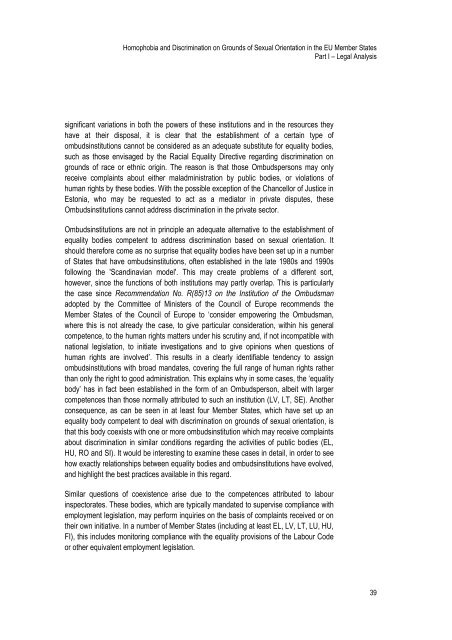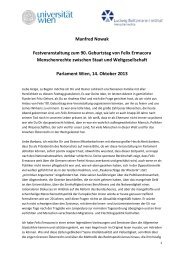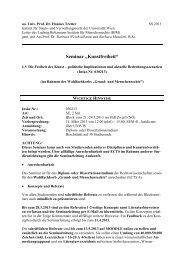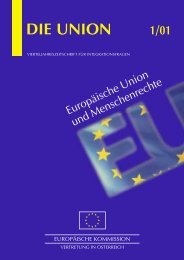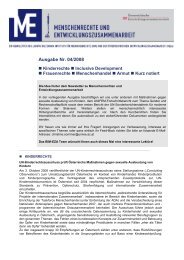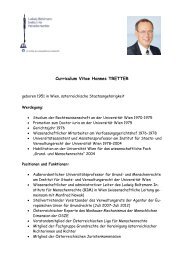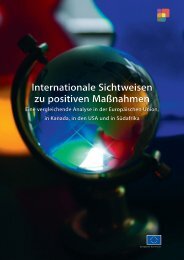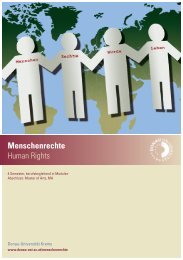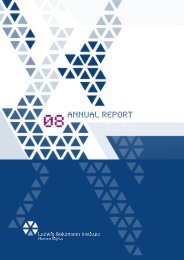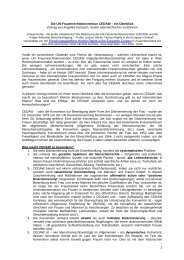Homophobia and Discrimination on Grounds of Sexual Orientation ...
Homophobia and Discrimination on Grounds of Sexual Orientation ...
Homophobia and Discrimination on Grounds of Sexual Orientation ...
Create successful ePaper yourself
Turn your PDF publications into a flip-book with our unique Google optimized e-Paper software.
<str<strong>on</strong>g>Homophobia</str<strong>on</strong>g> <str<strong>on</strong>g>and</str<strong>on</strong>g> <str<strong>on</strong>g>Discriminati<strong>on</strong></str<strong>on</strong>g> <strong>on</strong> <strong>Grounds</strong> <strong>of</strong> <strong>Sexual</strong> Orientati<strong>on</strong> in the EU Member StatesPart I – Legal Analysissignificant variati<strong>on</strong>s in both the powers <strong>of</strong> these instituti<strong>on</strong>s <str<strong>on</strong>g>and</str<strong>on</strong>g> in the resources theyhave at their disposal, it is clear that the establishment <strong>of</strong> a certain type <strong>of</strong>ombudsinstituti<strong>on</strong>s cannot be c<strong>on</strong>sidered as an adequate substitute for equality bodies,such as those envisaged by the Racial Equality Directive regarding discriminati<strong>on</strong> <strong>on</strong>grounds <strong>of</strong> race or ethnic origin. The reas<strong>on</strong> is that those Ombudspers<strong>on</strong>s may <strong>on</strong>lyreceive complaints about either maladministrati<strong>on</strong> by public bodies, or violati<strong>on</strong>s <strong>of</strong>human rights by these bodies. With the possible excepti<strong>on</strong> <strong>of</strong> the Chancellor <strong>of</strong> Justice inEst<strong>on</strong>ia, who may be requested to act as a mediator in private disputes, theseOmbudsinstituti<strong>on</strong>s cannot address discriminati<strong>on</strong> in the private sector.Ombudsinstituti<strong>on</strong>s are not in principle an adequate alternative to the establishment <strong>of</strong>equality bodies competent to address discriminati<strong>on</strong> based <strong>on</strong> sexual orientati<strong>on</strong>. Itshould therefore come as no surprise that equality bodies have been set up in a number<strong>of</strong> States that have ombudsinstituti<strong>on</strong>s, <strong>of</strong>ten established in the late 1980s <str<strong>on</strong>g>and</str<strong>on</strong>g> 1990sfollowing the 'Sc<str<strong>on</strong>g>and</str<strong>on</strong>g>inavian model'. This may create problems <strong>of</strong> a different sort,however, since the functi<strong>on</strong>s <strong>of</strong> both instituti<strong>on</strong>s may partly overlap. This is particularlythe case since Recommendati<strong>on</strong> No. R(85)13 <strong>on</strong> the Instituti<strong>on</strong> <strong>of</strong> the Ombudsmanadopted by the Committee <strong>of</strong> Ministers <strong>of</strong> the Council <strong>of</strong> Europe recommends theMember States <strong>of</strong> the Council <strong>of</strong> Europe to ‘c<strong>on</strong>sider empowering the Ombudsman,where this is not already the case, to give particular c<strong>on</strong>siderati<strong>on</strong>, within his generalcompetence, to the human rights matters under his scrutiny <str<strong>on</strong>g>and</str<strong>on</strong>g>, if not incompatible withnati<strong>on</strong>al legislati<strong>on</strong>, to initiate investigati<strong>on</strong>s <str<strong>on</strong>g>and</str<strong>on</strong>g> to give opini<strong>on</strong>s when questi<strong>on</strong>s <strong>of</strong>human rights are involved’. This results in a clearly identifiable tendency to assignombudsinstituti<strong>on</strong>s with broad m<str<strong>on</strong>g>and</str<strong>on</strong>g>ates, covering the full range <strong>of</strong> human rights ratherthan <strong>on</strong>ly the right to good administrati<strong>on</strong>. This explains why in some cases, the ‘equalitybody’ has in fact been established in the form <strong>of</strong> an Ombudspers<strong>on</strong>, albeit with largercompetences than those normally attributed to such an instituti<strong>on</strong> (LV, LT, SE). Anotherc<strong>on</strong>sequence, as can be seen in at least four Member States, which have set up anequality body competent to deal with discriminati<strong>on</strong> <strong>on</strong> grounds <strong>of</strong> sexual orientati<strong>on</strong>, isthat this body coexists with <strong>on</strong>e or more ombudsinstituti<strong>on</strong> which may receive complaintsabout discriminati<strong>on</strong> in similar c<strong>on</strong>diti<strong>on</strong>s regarding the activities <strong>of</strong> public bodies (EL,HU, RO <str<strong>on</strong>g>and</str<strong>on</strong>g> SI). It would be interesting to examine these cases in detail, in order to seehow exactly relati<strong>on</strong>ships between equality bodies <str<strong>on</strong>g>and</str<strong>on</strong>g> ombudsinstituti<strong>on</strong>s have evolved,<str<strong>on</strong>g>and</str<strong>on</strong>g> highlight the best practices available in this regard.Similar questi<strong>on</strong>s <strong>of</strong> coexistence arise due to the competences attributed to labourinspectorates. These bodies, which are typically m<str<strong>on</strong>g>and</str<strong>on</strong>g>ated to supervise compliance withemployment legislati<strong>on</strong>, may perform inquiries <strong>on</strong> the basis <strong>of</strong> complaints received or <strong>on</strong>their own initiative. In a number <strong>of</strong> Member States (including at least EL, LV, LT, LU, HU,FI), this includes m<strong>on</strong>itoring compliance with the equality provisi<strong>on</strong>s <strong>of</strong> the Labour Codeor other equivalent employment legislati<strong>on</strong>.39


